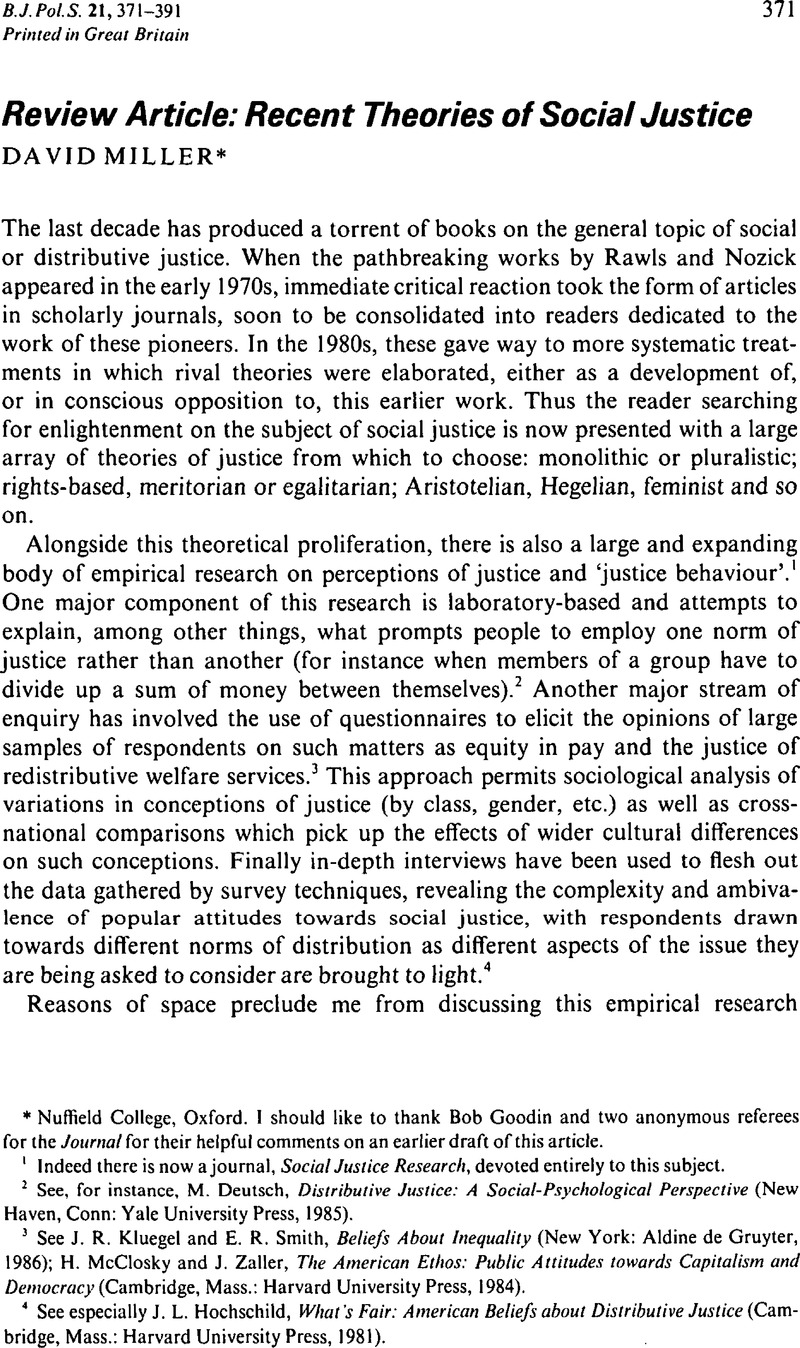Article contents
Recent Theories of Social Justice
Published online by Cambridge University Press: 27 January 2009
Abstract

- Type
- Review Article
- Information
- Copyright
- Copyright © Cambridge University Press 1991
References
1 Indeed there is now a journal, Social Justice Research, devoted entirely to this subject.
2 See, for instance, Deutsch, M., Distributive Justice: A Social-Psychological Perspective (New Haven, Conn: Yale University Press, 1985).Google Scholar
3 See Kluegel, J. R. and Smith, E. R., Beliefs About Inequality (New York: Aldine de Gruyter, 1986)Google Scholar; McClosky, H. and Zaller, J., The American Ethos: Public Attitudes towards Capitalism and Democracy (Cambridge, Mass.: Harvard University Press, 1984).CrossRefGoogle Scholar
4 See especially Hochschild, J. L., What's Fair: American Beliefs about Distributive Justice (Cambridge, Mass.: Harvard University Press, 1981).Google Scholar
5 There is a helpful survey in Soltan, K. E., ‘Empirical Studies of Distributive Justice’, Ethics, 92 (1981–1982), 673–91.CrossRefGoogle Scholar I am currently working on a paper that reviews the body of empirical research on justice, provisionally titled ‘Distributive Justice: The Facts’.
6 Soltan, K. E., The Causal Theory of Justice (Berkeley: University of California Press, 1987).Google Scholar
7 See especially Rawls, J., ‘Kantian Constructivism in Moral Theory’, Journal of Philosophy, 77 (1980), 515–72Google Scholar; ‘Justice as Fairness: Political not Metaphysical’, Philosophy and Public Affairs, 14 (1985), 223–51Google Scholar; ‘The Idea of an Overlapping Consensus’, Oxford Journal of Legal Studies, 1 (1987), 1–25.Google Scholar For Sandel's critique, see Sandel, M., Liberalism and the Limits of Justice (Cambridge: Cambridge University Press, 1982).Google Scholar The symposium on the Rawlsian theory of justice in the fourth issue of Ethics, 99 (1989)Google Scholar gives a good picture of the current state of ‘Rawls studies’.
8 Jones, Peter, ‘Re-Examining Rights’, British Journal of Political Science, 19 (1989), 69–96.CrossRefGoogle Scholar
9 Dworkin, R., ‘Equality of Welfare’, Philosophy and Public Affairs, 10 (1981), 185–246Google Scholar; Dworkin, R., ‘Equality of Resources’, Philosophy and Public Affairs, 10 (1981), 283–345.Google Scholar I have commented critically on Dworkin's work and some of the responses to it in ‘Equality’ in Hunt, G. M. K., ed., Philosophy and Politics (Cambridge: Cambridge University Press, 1990).Google Scholar
10 Important work includes Beitz, C., Political Theory and International Relations (Princeton, NJ: Princeton University Press, 1979)Google Scholar; Shue, H., Basic Rights: Subsistence, Affluence and US Foreign Policy (Princeton, NJ: Princeton University Press, 1980)Google Scholar; Barry, B., ‘Humanity and Justice in Global Perspective’ and ‘Justice as Reciprocity’ in Democracy, Power and Justice (Oxford: Clarendon Press, 1989)Google Scholar; and the essays collected in Luper-Foy, S., ed., Problems of International Justice (Boulder, Colo.: Westview Press, 1988).Google Scholar
11 Campbell, Tom, Justice (London: Macmillan, 1988)CrossRefGoogle Scholar; Barry, B., Theories of Justice (Brighton: Harvester-Wheatsheaf, 1989).Google Scholar
12 Gauthier, David, Morals by Agreement (Oxford: Clarendon Press, 1986).Google Scholar
13 See Frohlich, N., Oppenheimer, J. A. and Eavey, C. L., ‘Laboratory Results on Rawls's Distributive Jutice’, British Journal of Political Science, 17 (1987), 1–21CrossRefGoogle Scholar; Frohlich, N., Oppenheimer, J. A. and Eavey, C. L., ‘Choices of Principles of Distributive Justice in Experimental Groups’, American Journal of Political Science, 31 (1987), 606–36CrossRefGoogle Scholar; Frohlich, N. and Oppenheimer, J. A., ‘Choosing Justice in Experimental Democracies with Production’, American Political Science Review, 84 (1990), 461–77.CrossRefGoogle Scholar
14 There is an ambiguity in ‘agreement’ which may help to disguise this fact. Compare ‘we all agreed that the bird had orange tail feathers’ with ‘we all agreed that we would meet at the restaurant’. In the second case it is implicit that we would have behaved differently but for the fact of the agreement; in the first case, by contrast, ‘agreement’ is used to describe a spontaneous convergence of judgements. In Barry's understanding of the original position there is agreement in the first sense and hence no need and no room for ‘an agreement’ or anything that we could reasonably describe as a contract.
15 Soltan, , The Causal Theory of Justice.Google Scholar
16 See Elster, J., The Cement of Society (Cambridge: Cambridge University Press, 1989)CrossRefGoogle Scholar for an analysis of the kind. For an interesting study of how one particular norm of justice – equal pay for men and women doing jobs of comparable worth – fared when implemented among unionized groups of public-sector workers in Minnesota, see Evans, S. M. and Nelson, B. J., Wage Justice: Comparable Worth and the Paradox of Technocratic Reform (Chicago: University of Chicago Press, 1989).Google Scholar
17 Of course individuals may rationalize their superior bargaining position in terms of fairness; but this would be likely to show up in differences of perception between groups as to the fair wage for the more powerful group.
18 Sher, G., Desert (Princeton, NJ: Princeton University Press, 1987)Google Scholar; Sadurski, W., Giving Desert Its Due (Dordrecht: D. Reidel, 1985).CrossRefGoogle Scholar
19 Walzer, M., Spheres of Justice (Oxford: Martin Robertson, 1983), Chap. 11.Google Scholar
20 Assuming an equal basic entitlement to natural resources would allow some arguments of this kind to be launched, but not those referring to disabled or handicapped people, whom Campbell apparently hopes to include under his desert-based principle of need.
21 MacIntyre, A., Whose Justice? Which Rationality? (London: Duckworth, 1988).Google Scholar
22 See Adkins, A. W. H., Merit and Responsibility: A Study in Greek Values (Oxford: Oxford University Press, 1960).Google Scholar
23 See Miller, D., Market, State and Community: Theoretical Foundations of Market Socialism (Oxford: Clarendon Press, 1989), chap. 2.Google Scholar, where the problems with Hayek's view are also discussed.
24 Kirzner, I. M., Discovery, Capitalism and Distributive Justice (Oxford: Blackwell, 1989).Google Scholar
25 Okin, S. M., Justice, Gender and the Family (New York: Basic Books, 1989)Google Scholar
26 I have discussed Walzer's position on this issue in ‘Deserving Jobs’ (unpublished).
- 19
- Cited by




